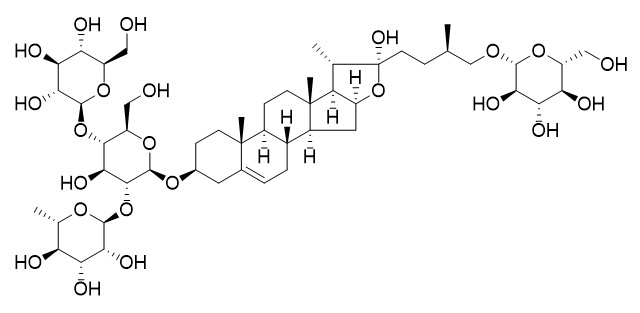Protodeltonin
Protodeltonin may have anti-thrombotic activity by both improving the anticoagulation activity and inhibiting platelet aggregation action. Protodeltonin can inhibit the proliferation of a panel of established human and murine cancer cell lines in vitro.
Inquire / Order:
manager@chemfaces.com
Technical Inquiries:
service@chemfaces.com
Tel:
+86-27-84237783
Fax:
+86-27-84254680
Address:
1 Building, No. 83, CheCheng Rd., Wuhan Economic and Technological Development Zone, Wuhan, Hubei 430056, PRC
Providing storage is as stated on the product vial and the vial is kept tightly sealed, the product can be stored for up to
24 months(2-8C).
Wherever possible, you should prepare and use solutions on the same day. However, if you need to make up stock solutions in advance, we recommend that you store the solution as aliquots in tightly sealed vials at -20C. Generally, these will be useable for up to two weeks. Before use, and prior to opening the vial we recommend that you allow your product to equilibrate to room temperature for at least 1 hour.
Need more advice on solubility, usage and handling? Please email to: service@chemfaces.com
The packaging of the product may have turned upside down during transportation, resulting in the natural compounds adhering to the neck or cap of the vial. take the vial out of its packaging and gently shake to let the compounds fall to the bottom of the vial. for liquid products, centrifuge at 200-500 RPM to gather the liquid at the bottom of the vial. try to avoid loss or contamination during handling.
Molecules.2016, 21(10)
Eur J Pharmacol.2021, 899:174010.
Phytochemistry.2017, 141:162-170
Pharmacognosy Magazine2024, 20(2):632-645.
Integr Med Res.2024, 13(1):101025.
Institute of Food Science & Technology2021, 45(9).
Srinakharinwirot University2023, 2669.
Applied Biological Chemistry 2021, 64(75)
Curr Issues Mol Biol.2023, 45(2):1587-1600.
Jour. of Stored Pro & Postharvest Res.2016, 7(3):32-36
Related and Featured Products
Steroids. 2012 Oct;77(12):1219-27.
Cytotoxicity and apoptosis-inducing effect of steroidal saponins from Dioscorea zingiberensis Wright against cancer cells.[Pubmed:
22575181 ]
Steroidal saponins from Dioscorea zingiberensis Wright (DZW) have shown cytotoxic activity in cancer cells.
METHODS AND RESULTS:
In this study, we isolated and identified seven steroidal saponins from the rhizomes of DZW: diosgenin, trillin, diosgenin diglucoside, deltonin, zingiberensis saponin (ZS), Protodeltonin and parvifloside. Our results showed that these seven compounds inhibited the proliferation of a panel of established human and murine cancer cell lines in vitro. ZS had more cytotoxic effect than the other saponins, even close to doxorubicin on the murine colon carcinoma cell line C26. The proliferation inhibitory effect of ZS was associated with its apoptosis-inducing effect by activation of caspase-3 and caspase-9 and specific proteolytic cleavage of poly (ADP-ribose) polymerase. Exposure of C26 to ZS also resulted in Bax upregulation and Bcl-2 downregulation.
CONCLUSIONS:
In conclusion, the findings of this study demonstrated that ZS is an effective natural agent for cancer therapy, which may be mediated, in part, by induction of apoptosis, and DZW's potential as an anticancer agent is worth being further investigated.
Fitoterapia. 2010 Dec;81(8):1147-56.
Anti-thrombotic activity and chemical characterization of steroidal saponins from Dioscorea zingiberensis C.H. Wright.[Pubmed:
20659537]
Steroidal saponins have long attracted scientific attention, due to their structural diversity and significant biological activities. Total steroidal saponins (TSS) extracted from the rhizomes of Dioscorea zingiberensis C.H. Wright (DZW) constitute an effective treatment for cardiovascular disease. However, the active constituents contained in DZW rhizomes and their pharmacological properties are not fully understood. The aim of this work is to determine and quantify the active constituents in DZW rhizomes using fingerprint technique, and evaluate its anti-thrombotic activity using inferior vena cava ligation thrombosis rat model and pulmonary thrombosis mice model after being gavaged with TSS for 1 or 2weeks.
METHODS AND RESULTS:
In the study, a chemical fingerprint method was firstly established and validated to quantify and standardize TSS from DZW rhizomes including parvifloside, Protodeltonin, protodioscin, protogracillin, zingiberensis saponin, deltonin, dioscin and trillin. TSS extracted from DZW rhizomes were showed to have the inhibitions on platelet aggregation (PAG) and thrombosis, and prolong activated partial thromboplastin time (APTT), thrombin time (TT), and prothrombin time (PT) in a dose-dependent manner in rats. TSS also prolonged the bleeding time and clotting time in a dose-dependent manner in mice.
CONCLUSIONS:
The results indicate that TSS could inhibit thrombosis by both improving the anticoagulation activity and inhibiting PAG action, suggesting that TSS from DZW rhizomes have the potential to reduce the risk of cardiovascular diseases by anti-thrombotic action.



